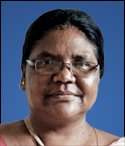 — Dayamani Barla, National President, Indian Social Action Forum (INSAF)
— Dayamani Barla, National President, Indian Social Action Forum (INSAF)
Indian Social Action Forum, a national forum of over 700 movements and NGOs in India, is committed to resist globalisation, combat communalism, defend democracy and create an economically equitable, socially just and ecologically sustainable democratic society. Dayamani Barla spoke to Sandeep Menezes on how development is taking a heavy toll on the lives of the rural people and their already meagre livelihoods.
Are you fundamentally opposed to all development activities in tribal areas?
We are not opposed to all development activities. We want development but which model of development and at what cost? Our definition of development is sustainable development. We want durable and balanced development.
Jharkhand is a mineral-rich state with abundant mineral wealth. In last 12 years since the formation of the state, the government has signed MoUs with more than 104 companies. Out of these around 98 per cent MoUs are only with steel making and mining companies. If all these companies are provided land for mining, factories, dams and other allied activities, then not even an inch of land will remain for advasis, farmers and future generations.
What type of development are we talking about? Development means environment needs to be preserved, forest needs to be protected, and agricultural land must remain fertile. In north Jharkhand, many rivers and their tributaries have become polluted; even a drop of water can’t be utilised for farming, for animals or human consumption.
What solutions would you suggest then?
First, there is a need to redevelop those lands that have been destroyed due to mining activities in the past and then put up factories on those lands. Clean up those rivers that have become polluted due to mining and industrial activities and then use that same water for new projects. Set up educational institutions on such lands because they have become infertile due to mining and hence not fit for agricultural activities. But don’t acquire more fertile lands, displace adivasis and destroy additional land. This is called sustainable development.
Why did you oppose Arcelor Mittal’s steel project in Jharkhand?
Adivasi (tribal) communities believe that water, forest, land, rivers and mountains are not property, it is their heritage. The identity, language, culture, history and economic dependence of these communities are linked to these land and forest. If these adivasi communities are displaced from their land and forest, then their collectiveness and existence is threatened. This is not my opinion but the history of these adivasi communities. These adivasis are aware that if they are displaced from their land they will be finished.
The government wants to pass the food security bill. But Arcelor Mittal wants agricultural land for its steel plant. Along with the steel plant they want to build a thermal power plant and dam; there would be too much environmental degradation. The government says it will compensate but how can anyone compensate us by taking away our land and forest?
Wouldn’t the project have created large employment opportunities for the locals?
Since independence, around two crore people have been displaced in Jharkhand alone; out of these nearly 80 per cent belonged to adivasi communities. Today, nobody is aware of whereabouts of these people or in which condition they are living.
When Heavy Engineering Corporation was set up in 1958 and displaced thousands of adivasis, only 2,000 displaced adivasi people were provided jobs out of a total of 22,000 job appointments. Nobody knows the condition of the remaining displaced adivasis.
An estimated 30,000 to 40,000 adivasi people were displaced when Bokaro Steel Plant was set up around 1978. Today, those people are homeless and their lives are meaningless. The government has not provided them with homes, education for their children or given them amenities.
Looking at these past incidents, our organisation decided to oppose projects that cause displacement and suffering to adivasi communities.
The government says it will provide jobs but how many people will it provide employment for. The government wants to acquire land for setting up plants and factories, but will they provide one job per family. Our land and forests have provided employment since our forefathers and it will continue to do so for our future generations.
Do you feel local opposition will reduce if appropriate compensation is provided against land acquisition?
How can anyone offer adequate compensation for taking away our culture, history, heritage, language and lives? How can enough compensation be offered for clean water and pure air? These things can’t be adequately compensated; it’s simply not possible.
The proposed Mining Act provides for mandatory spending of 26 per cent of profits of mining companies for local area development. If this law is implemented, do you think there won’t be much opposition to mining in hilly and tribal areas?
You may not be aware but most corporate houses have been opposing this act. Earlier, the act had proposed only 1 per cent of net profits to be distributed amongst project-affected people which was opposed by corporate houses and the whole issue went into the cold storage.
Now the act talks of 26 per cent for project-affected people, but the government later amended the act and removed the 26 per cent clause due to opposition from corporate houses.
If the government is unable to implement the act on paper, how will it implement the act on the ground?
Rural India is yet to witness infrastructure development.
If the government thinks that the best model of development means the concrete jungle witnessed in New York then it should stop speaking about farmers and about issues like food security, global warming or human development.
Everyone is speaking about protecting forests – why? On one hand, you desire a concrete jungle and then you seek pure air, clean water and good environment. This will not work. The government needs to be clear on its developmental model and the route it needs to choose.
I always say that development work should be carried out on infertile land but don’t cut forest or utilise fertile land. This is true development and this should be the developmental model.
How has the implementation of National Rural Employment Guarantee Act (NREGA) been in Rural India?
I have done a full study on NREGA and know how people have been ditched through this scheme. The rights of labourers were violated and their rightful compensation denied.
The government claims that NREGA has been successful to the extent of nearly 80 per cent. But farmers are being cheated since many wells only exist on paper. The farmer, himself, is not aware that a well exists on his farmland. If some villages have nearly 500 to 1,000 wells, then why is there drought in those villages? With these many wells existing, where is the need to build additional dams?
The situation can’t be improved till there is corruption. Therefore, whatever scheme is introduced it is bound to fail. Poverty will not reduce but poor people will perish











